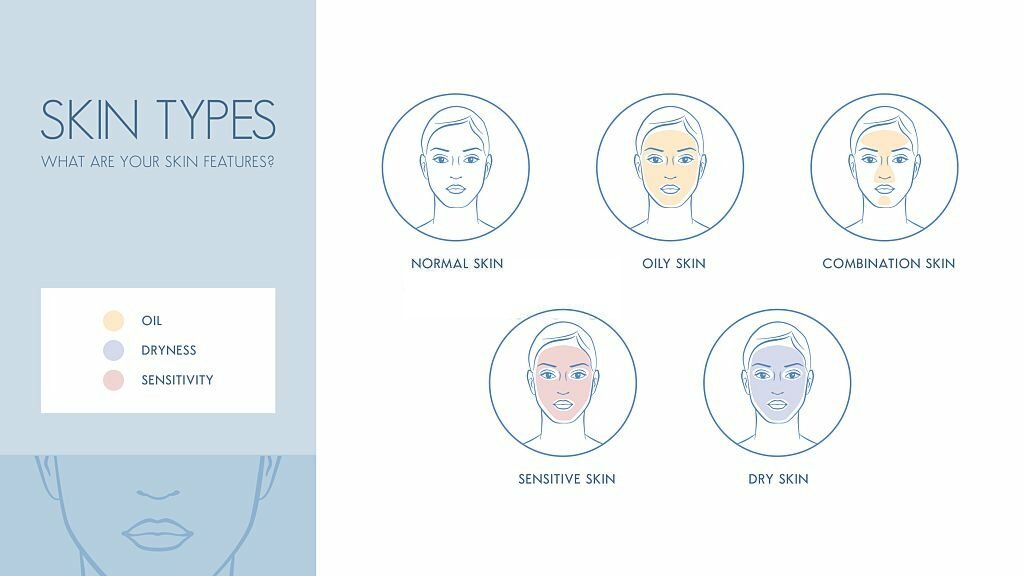Skin Type – Ever wondered why your friend’s go-to moisturizer works wonders for them but leaves your skin feeling a bit meh? Well, you’re in for a treat because today, we’re going to discuss skincare, specifically the one-size-does-not-fit-all realm of skin types.
Your skin, that beautiful canvas that tells your story, is unique, just like you. Whether you’re basking in the glow of normal skin, navigating the oil slicks of the T-zone, tackling dry patches, or experiencing the combo platter that is combination skin – we’ve got you covered.
In this guide, we’re spilling the tea on everything skin-related. We’ll walk you through the ABCs of normal, oily, dry, combination, and sensitive skin types. Think of it as your personalized skincare handbook, helping you decode the mysteries of your skin and curate a routine that feels like a spa day for your face.
So, grab your favorite skincare treats, kick back, and let’s embark on a journey to uncover the secrets of your skin. Because when it comes to skincare, knowledge truly is the key to unlocking your skin’s full, radiant potential.
Ready to become your own skincare guru? Let’s get started!
The Different Skin Types
1 – Normal Skin
Normal skin is the gold standard – not too oily, not too dry. It has a balanced oil production, minimal imperfections, and a radiant complexion. If you’re lucky enough to have normal skin, your primary goal is maintenance and protection.
Recommended Skincare Routine
Maintaining normal skin involves a balanced approach to skincare that focuses on protection and preservation.
Use a Gentle Cleanser to Maintain Balance:
- Opt for a mild, gentle cleanser that removes impurities without disrupting the skin’s natural balance.
- Consider a water-based cleanser for a refreshing and effective cleanse.
Moisturize Regularly to Keep the Skin Hydrated:
- Even though normal skin isn’t excessively dry, regular moisturization is essential to keep the skin hydrated and maintain its natural elasticity.
- Choose a moisturizer with a balanced formula that suits your skin’s needs.
Apply Sunscreen Daily to Protect Against UV Rays:
- Protect your skin from the harmful effects of UV rays by applying a broad-spectrum sunscreen with at least SPF 30.
- Sunscreen not only prevents sun damage but also helps maintain your skin’s youthful appearance.
Recommended Skincare Products
Normal skin benefits from products that enhance its natural state without causing imbalance.
Balanced Moisturizers:
- Look for moisturizers that provide hydration without being too heavy or light.
- Gel-based or lotion-formula moisturizers can work well for normal skin.
Mild Cleansing Solutions:
- Use gentle, hydrating cleansers that effectively cleanse the skin without causing dryness or irritation.
- Consider cleansers with added antioxidants for extra skin protection.
Sunscreen with Broad-Spectrum Protection:
- Choose sunscreens that offer both UVA and UVB protection.
- Opt for a sunscreen that suits your preferences, whether it’s a lightweight lotion or a more nourishing cream.
2 – Oily Skin
Oily skin tends to produce excess sebum, leading to a shiny complexion and enlarged pores. While this skin type is prone to acne, it also has its advantages – fewer wrinkles and fine lines.
Tips for Managing Oily Skin
Oily skin can be challenging to manage, but with the right approach, you can maintain a healthy balance.
Choose the Right Cleanser:
- Opt for a foaming or gel-based cleanser to effectively remove excess oil without stripping the skin of its natural moisture.
- Consider cleansers containing salicylic acid to help control oil production and prevent breakouts.
Hydrate Without Adding Oil:
- Contrary to popular belief, oily skin needs hydration. Use oil-free, non-comedogenic moisturizers to keep your skin balanced.
- Look for ingredients like hyaluronic acid, which hydrates the skin without clogging pores.
Incorporate Acids into Your Routine:
- Salicylic acid and benzoyl peroxide can be beneficial for controlling oil and preventing acne. Introduce them gradually to avoid irritation.
- Use a gentle exfoliating acid, such as glycolic or lactic acid, to remove dead skin cells and promote a smoother complexion.
Recommended Skincare Products
Managing oily skin involves choosing the right products that control excess oil while nourishing the skin.
Oil-Free Moisturizers:
- Look for lightweight, oil-free moisturizers to hydrate without adding to the skin’s natural oiliness.
- Gel-based moisturizers are an excellent choice for oily skin as they absorb quickly.
Mattifying Primers:
- Before applying makeup, consider using a mattifying primer to create a smooth base and control shine throughout the day.
- These primers can help your makeup last longer and reduce the need for frequent touch-ups.
Clay Masks for Oil Absorption:
- Incorporate clay masks into your skincare routine to absorb excess oil and unclog pores.
- Use them once or twice a week to maintain a clear and matte complexion.
3 – Dry Skin
Dry skin lacks proper hydration, often resulting in a dull, flaky appearance. It’s crucial to focus on moisturizing and replenishing lost moisture.
Tips for Managing Dry Skin
Combatting dry skin involves a combination of hydrating products and a gentle skincare routine.
Choose a Hydrating, Creamy Cleanser:
- Opt for cleansers that are gentle and hydrating. Cream-based cleansers are excellent for dry skin as they clean without stripping away essential oils.
- Avoid using hot water, as it can further dry out the skin. Stick to lukewarm water for cleansing.
Use Rich, Emollient Moisturizers:
- Invest in moisturizers that are rich in emollients like shea butter or ceramides to create a protective barrier on the skin.
- Apply moisturizer immediately after cleansing to lock in hydration.
Apply a Nourishing Overnight Mask:
- Enhance hydration by using overnight masks or deeply hydrating serums. These products work while you sleep to repair and replenish the skin.
- Consider incorporating hyaluronic acid into your routine, a powerful humectant that attracts and retains moisture.
Recommended Skincare Products
Dry skin requires products that focus on intense hydration and nourishment.
Hyaluronic Acid Serums:
- Hyaluronic acid serums provide deep hydration, helping to plump and rejuvenate dry skin.
- Apply a few drops before your moisturizer to boost the skin’s moisture levels.
Cream-Based Cleansers:
- Creamy cleansers with moisturizing ingredients are gentle on dry skin and help prevent further moisture loss.
- Look for cleansers with ingredients like glycerin or ceramides.
Gentle Exfoliants to Remove Dead Skin Cells:
- Use gentle exfoliants, such as alpha hydroxy acids (AHAs) or beta hydroxy acids (BHAs), to remove dead skin cells and promote cell turnover.
- Exfoliate 1-2 times a week to reveal a smoother and more radiant complexion.

4 – Combination Skin
Combination skin presents a mix of different skin types on various parts of the face. Typically, the T-zone (forehead, nose, and chin) is oily, while the cheeks may be normal or dry.
Tips for Managing Combination Skin
Balancing combination skin requires a targeted approach that addresses the unique needs of different areas of the face.
Use Different Products for Different Areas of the Face:
- Recognize that different areas of your face have different needs. Choose skincare products that cater to the specific characteristics of each zone.
- Opt for a gentle, hydrating cleanser for the drier areas and oil-controlling products for the T-zone.
Adjust Your Skincare Routine Based on Specific Needs:
- Be flexible with your skincare routine. Use lighter products for the oilier areas and richer formulations for drier regions.
- Consider spot treatments or different moisturizers for targeted care.
Consider Gel-Based Moisturizers for the T-Zone and Creamier Ones for the Cheeks:
- Tailor your moisturizer to each area. Gel-based moisturizers work well for controlling oil in the T-zone, while creamier formulations provide the necessary hydration for the cheeks.
Recommended Skincare Products
Combination skin benefits from products that strike a balance between hydration and oil control.
Multi-Masking Products:
- Experiment with multi-masking to address the diverse needs of different facial zones.
- Apply a purifying mask to the T-zone and a hydrating mask to the cheeks simultaneously.
Lightweight Moisturizers:
- Use lightweight, non-comedogenic moisturizers for the oilier areas to avoid clogging pores.
- Look for moisturizers that balance hydration without adding excess oil.
Non-Comedogenic Sunscreens:
- Select sunscreens labeled as non-comedogenic to prevent clogged pores.
- Sunscreens with a lightweight formula are ideal for combination skin.
5 – Sensitive Skin
Sensitive skin is prone to redness, itching, and irritation. It requires extra care, as harsh products or environmental factors can trigger reactions.
Tips for Managing Sensitive Skin
Caring for sensitive skin involves selecting products with minimal ingredients and gentle formulations.
Choose Fragrance-Free and Hypoallergenic Products:
- Fragrances can be irritating to sensitive skin. Opt for products labeled as fragrance-free and hypoallergenic to minimize the risk of reactions.
- Read ingredient lists carefully, avoiding products with known irritants.
Patch-Test New Products Before Applying:
- Before applying a new skincare product to your face, perform a patch test on a small area to check for any adverse reactions.
- This precautionary step can help you identify potential irritants before applying them to your entire face.
Avoid Harsh Exfoliants and Opt for Mild, Soothing Ingredients:
- Skip abrasive exfoliants and choose products with mild exfoliating ingredients like chamomile or aloe vera.
- Gentle exfoliation helps remove dead skin cells without causing irritation.
Recommended Skincare Products
Sensitive skin requires products that soothe and protect without causing irritation.
Fragrance-Free Moisturizers:
- Choose moisturizers without added fragrances to minimize the risk of skin reactions.
- Look for products with calming ingredients like chamomile or calendula.
Calming Toners with Chamomile or Aloe Vera:
- Incorporate toners with soothing ingredients to calm sensitive skin.
- Chamomile or aloe vera-infused toners can provide a refreshing and calming sensation.
Sunscreens Designed for Sensitive Skin:
- Select sunscreens specifically formulated for sensitive skin.
- Mineral-based sunscreens with zinc oxide or titanium dioxide can be less irritating than chemical sunscreens.
Wrapping it Up
And there you have it! We’ve discussed different skin types, from normal, oily, dry, and combination to sensitive skin. Armed with this newfound knowledge, you’re now equipped to create a skincare routine that’s as unique as you are.
Remember, the beauty of skincare lies in the ritual, the self-care moments you gift yourself each day. So, whether you’re indulging in a hydrating mask, finding the perfect moisturizer dance for your T-zone, or soothing sensitive spots with a gentle touch, relish these moments. Your skin deserves it.
Embrace the quirks of your skin type, celebrate the glow-ups, and treat your skin with the kindness it deserves. Skincare isn’t just about looking good; it’s about feeling good in the skin you’re in. Cheers to radiant complexions, healthy skin barriers, and the confidence that comes from knowing your skin inside and out.
Until our next skincare appointment, glow on, you radiant beings!



